
by Ecoziva (Brazil) | Nov 12, 2014 | 2014, Awareness, Brazil, Childhood, Cultural Differences, Entertainment, Family, International, Kids, Life Lesson, Milestones, Moving, Nutrition, Relationships, Stress, Tragedy, World Motherhood
This is the second post of a two-part series. To read part I of this post, please click here
 It was my fourth birthday party. Since we were moving to Brazil soon, it was also a farewell party, and a big one. It was the only big birthday party I have had in my entire life. I remember it was held at some sort of club, there were a lot of people and a hired caterer (something almost unthinkable for my mother!) And then there was the clown. And he wanted to paint my face.
It was my fourth birthday party. Since we were moving to Brazil soon, it was also a farewell party, and a big one. It was the only big birthday party I have had in my entire life. I remember it was held at some sort of club, there were a lot of people and a hired caterer (something almost unthinkable for my mother!) And then there was the clown. And he wanted to paint my face.
I was completely and irrationally terrified as only a four-year-old can be. While most of the other children were loving it all, I wanted nothing to do with the clown and his face paint (and certainly not on my face!). My party was ruined. In fact, I hid in the kitchen the entire time.
I don’t know exactly who stayed with me in the kitchen, but I don’t think it was either of my parents – at least not all of the time. Of course they were probably running around organizing things and tending to the guests. What really comforted me at that moment was the food, more specifically the dozens of intricately decorated mini-ice cream cakes. I recall later telling someone that the good side of the party was that I had stayed close to the food the entire time.
Although I hadn’t thought of it in a while, this story is not something that had been forgotten or hidden in my mind, as it has been told and retold over the years by my mother. The interesting detail that came up now was that of the ice cream cakes. When I remembered the ice cream cakes I felt like I could eat a ceiling-high pile. I felt like I had been looking for them my entire life. It was such a visceral craving it felt like nothing else could fill up my void except for those ice cream cakes. Right now writing this I want those ice cream cakes so badly it almost hurts.
It is interesting because here in Brazil ice cream cakes are rare – I believe I have only seen them for sale once in the more than 30 years I have lived here. I don’t know why this particular detail only came up so strongly now, nor what has been triggering this strong need for comfort and protection, which originally was a need to be shielded from someone scary (the clown) who wanted to do something I did not want to do (paint my face).
I don’t know if this is related, but it is also funny because I was never a big fan of makeup. Also, once when I was six and went through a brief period of interest for makeup, I got a kit of child makeup and ate several of the flavored lipsticks that came with it!
Perhaps this story will bring about significant change in my relationship with food, perhaps not, but it does bring up several issues related to my relationship with my own children.
For instance, it has reminded me that no matter how I try, it is impossible to protect them from every traumatic incident or foresee the lasting effect of seemingly small events on their lives. On the other hand, it is also a strong reminder not to belittle the things that upset them – what might seem insignificant or minor to me may be a huge deal to them and I must give them the best emotional support we can at all times.
Please share your stories about your relationship with food. Do you interfere in your children’s relationship with food? Do you actively foster a healthy relationship with food in your home?
This is the continuation of an original post to World Moms Blog published by our writer in Brazil and mother of three, EcoZiva. You can read Part I here.
The image in this post is credited to Chris Martin. It holds a Flickr Creative Commons attribution license.
Eco, from the greek oikos means home; Ziva has many meanings and roots, including Hebrew (brilliance, light), Slovenian (goddess of life) and Sanskrit (blessing). In Brazil, where EcoZiva has lived for most of her life, giving birth is often termed “giving the light”; thus, she thought, a mother is “home to light” during the nine months of pregnancy, and so the penname EcoZiva came to be for World Moms Blog.
Born in the USA in a multi-ethnic extended family, EcoZiva is married and the mother of two boys (aged 12 and three) and a five-year-old girl and a three yearboy. She is trained as a biologist and presently an university researcher/professor, but also a volunteer at the local environmental movement.
More Posts

by Jennifer Iacovelli | Nov 4, 2014 | 2014, Africa, Awareness, Blogging, Girls, Human Rights, Humanitarian, Inspirational, International, Maternal Health, Millennium Development Goals, ONE, Social Good, Vaccines, Womanhood, World Bank, World Moms Blog
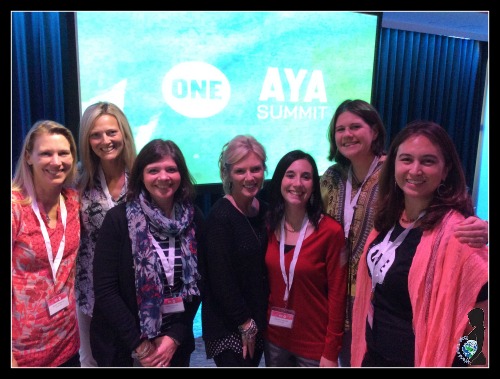
It has been almost two weeks since I attended the AYA Summit in Washington DC at Google’s offices with ONE, and I still feel a flood of emotion each time I think about the experience. As I wrote on my blog last week, the words to explain such a powerful and inspiring event are hard to come by.
The AYA Summit focused on issues facing girls and women in the developing world, with a special emphasis on Sub-Saharan Africa. The name AYA comes from an African Adinkra Symbol, which means fern and symbolizes endurance, resourcefulness and growth.
I, along with fellow World Moms Blog contributors Jennifer Burden, Elizabeth Atalay, Nicole Morgan, Nicole Melancon, Kelly Pugliano and Cindy Levin, sat in a room of about 80 bloggers and listened to inspiring panel after inspiring panel. In addition to thought-provoking conversations about human trafficking, the importance of vaccinations, electrifying Africa, making change through economic opportunities and the dire need to end Ebola in West Africa, we witnessed incredible performances by a young poet named Marquesha Babers and actress Danai Gurira.
Tears were shed. We were all moved and left wanting to do more for women and girls around the globe.
Why invite only bloggers to such a powerful event? According to this article from WUSA9 who covered the event, the combined audiences of our blogs exceeds 45 million and 28 states. As it was noted, “that kind of reach is priceless.”
There was a general theme of storytelling throughout the event. As bloggers, we have the ability to tell the stories of girls and women around the globe that the mainstream media simply cannot duplicate. We use our experiences as women, mothers and global citizens to lend our voices to those who don’t have a microphone and help others join in the conversation. We personalize the stories, talk about our concerns, and amplify the issues that media may not even be fully aware of or willing to devote the time to cover.
As Ginny Wolfe, Senior Director, Strategic Relationships at ONE, said at the very start of the AYA Summit, “We’re not asking for your money, we’re asking for your voice.” If you are reading this post, you can lend your voice too.
Though it is still hard to put into words what the AYA Summit meant to me, I thought I would share the highlights and key takeaways through a series of tweets during the event:
Read what other World Moms are writing about the event:
For more on the AYA Summit and the work that is coming from the event, visit and follow the AYA Summit 2014 Flipboard.
This is an original post written for World Moms Blog by Jennifer Iacovelli who also writes at www.anotherjennifer.com.
How will you or do you use your voice to stand up for those who are unable to speak up for themselves?
Jennifer Iacovelli is a writer, speaker and nonprofit professional. Based in Brunswick, Maine, she’s a proud single mom of two boys and one Siberian husky. Jennifer is the author of the Another Jennifer blog and creator of the Simple Giving Lab. Jennifer is also a contributing author of the book The Mother Of All Meltdowns. Her work has been featured on GOOD, BlogHer, USAID Impact, Feed the Future and the PSI Impact blog. Her latest book, Simple Giving: Easy Ways to Give Every Day, is available everywhere. Her passions are writing, philanthropy, her awesome kids and bacon, though not necessarily in that order.
More Posts

by Tina Marie Ernspiker | Oct 31, 2014 | 2014, Health, Home, Husband, International, Kids, Life Balance, Living Abroad, Mexico, Motherhood, Moving, Travel, World Motherhood
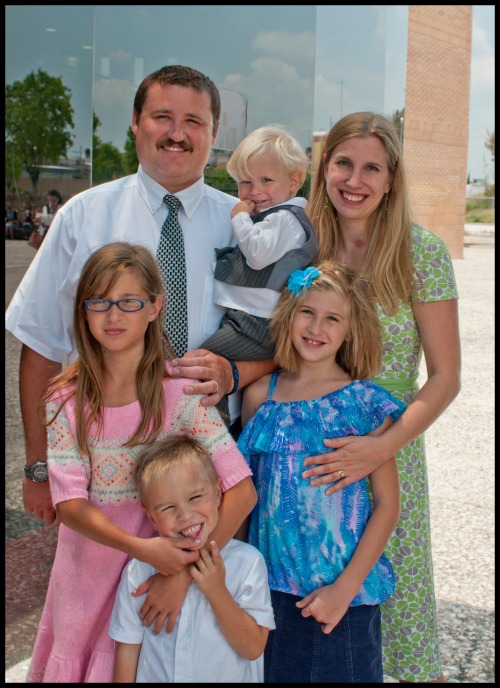 “I was not born for one corner; the whole world is my native land.” -Seneca
“I was not born for one corner; the whole world is my native land.” -Seneca
I don’t just believe this quote. I feel it. I am in love with our beautiful planet. The world is a gift filled with life, adventure, and beauty. Wonderful things await those who are willing to travel and experience this gift firsthand. I want these things for my children. I want them to have friends in every land and favorite places across the sea; to taste new flavors, see new sights, and hear new sounds; to know that this world was made for them, borders can be crossed, different is good, and change can open up doors. I want to broaden their horizons and open their minds to this gift, this world… our native land. (more…)

by World Moms Blog | Oct 22, 2014 | 2014, Africa, Awareness, Being Thankful, Caring, Casting a Wider Net, Communication, Economy, Education, Girls, Government, Guest Post, Helping, Human Rights, Humanitarian, Humanity, Inspirational, International, Life, Loss of Child, Media, Motherhood, Nigeria, Older Children, Poverty, Prejudice, Relationships, Safety, School, Social Equality, Terrorism, Tragedy, Women's Rights, Working Mother, World Mom Feature, World Motherhood, World Voice
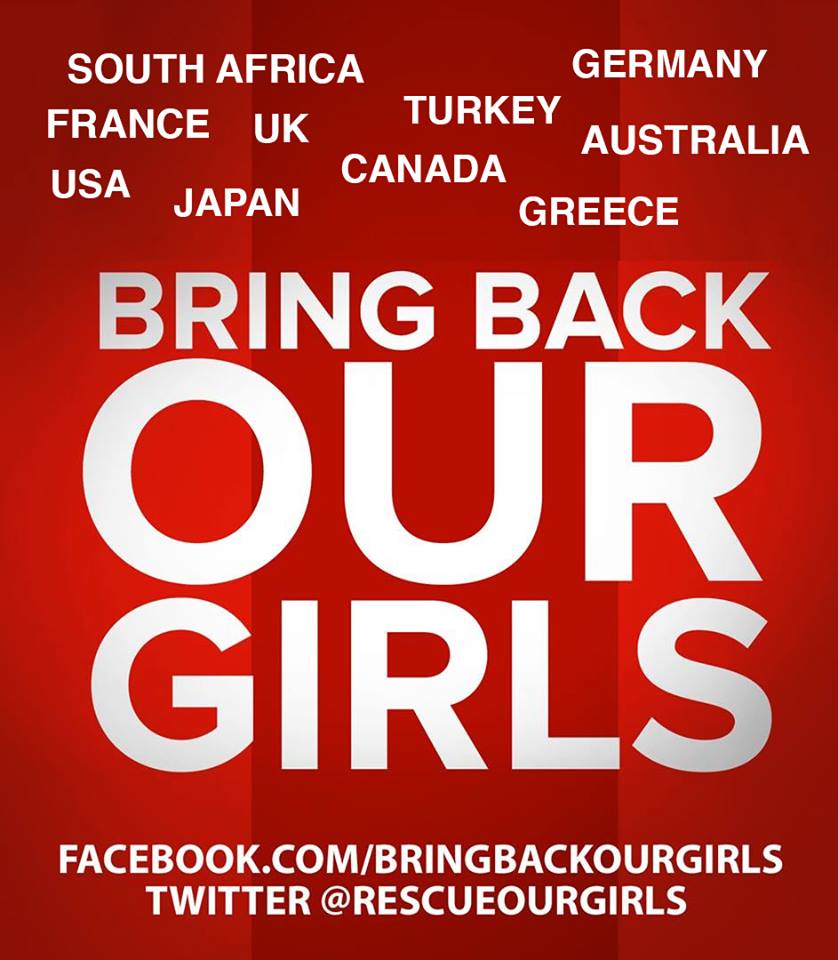 “My daughter said she was going to go to school so that she can wipe away my tears. How is she wiping my tears away in the den of the terrorists?”
“My daughter said she was going to go to school so that she can wipe away my tears. How is she wiping my tears away in the den of the terrorists?”
-mother of one of the #ChibokGirls, abducted on April 14th, 2014, speaking on Day 188 of their abduction -October 19th, 2014
As I looked at her I realized that all this woman’s hopes and aspirations rest on her daughter. For most of the poor people in this part of the world, children are like a source of pension; they are the ones that will help you in the future. They are the ones that will take care of you in your old age, when you are unable to look after yourself. They represent life. As I looked at her I also realized that her daughter means more to her than I can ever imagine. Her daughter is her everything. A source of hope.
These parents are ready to give their lives for their children to have an education. That was what the #ChibokParents did. Amidst the insecurity in Nigeria, they still wanted their children to be educated to better their positions in life. They knew the only way to break the shackles of poverty was through education. For daring to send their children to school to have a better life, instead they have been punished.
These children grow up to not only take care of their parents but siblings as well so that a generation of people who have survived the shackles of poverty would emerge.
For some, poverty is going to school in the morning without breakfast and returning home not expecting lunch but still striving everyday to be in school so that one day you will look back and say I SURVIVED (I AM A SURVIVOR).
I remember one of the fathers at one of our Sit Ins for the #BringbackOurGirls campaign—which started on April 30th with a protest demanding for the rescue of #ChibokGirls—saying he does not have a Television. All he has is a Radio from which he gets to hear of our activities. I wept! In this day of iPads, Tablets, iPhones and what have you, someone does not have a simple television that most of us take for granted.
So now you can begin to understand that to the #ChibokParents these girls are much more than daughters, they are future benefactors
A lot of parents, especially mothers, are forced to live a life of servitude and poverty in order for their children to be educated. The education that is taken for granted in most developed countries is not so in Nigeria and many other African countries.
I remember growing up and how my parents had to struggle to make sure we were educated. We often had to go without food when the situation grew dire but never were my school fees unpaid. I remember my father trekking long distance to buy a textbook I needed badly because the money was not enough for him to pay for a bus. All the suffering was for the children to be able to break the vicious cycle of poverty and one day to be able to take care of ourselves and also take care of our parents and siblings.
A lot of parents invest all they have in their children. For those who are poor, they do not have cars, houses or any investments. All they have are their children. Can you imagine these children being abducted, as is the case with the #ChibokGirls, abducted from school, where they wanted to get an education and make life better for themselves and their families? When these children of the poor are abducted and taken away, the future of a whole generation also is taken away.
As I looked at the woman with tears streaming down her face, all I could see was my own mum, who had to be the head-of-household, who worked all day and night to ensure I had an education. I look back to the days when there was no food to be eaten and yet we found our way to school. I thought of what a burden it must have been for my parents to get us educated, to sacrifice all that they had.
While some of my parent’s contemporaries were busy enjoying life in the way they could with what they had, my parents tightened their belt to make sure that we, their children, had an education and of course today we are their pension. If any of us had been abducted while seeking an education, where would we be today?
As I stood watching the Chibok mother, all I could think about was my mother struggling to give her children the life she did not have and how hard she worked to provide that for us. I thought of my mother, now living in the lap of luxury because she worked so hard four sake. As I stood looking at the Chibok Mother, I realized she too must be allowed to break the shackles of poverty. She too must live in comfort, as her daughter promised her. Her tears must be wiped away. As I stood looking at her I realized that I cannot stop demanding for the rescue of the #ChibokGirls, for that Chibok mother who has given her all, hoping that one day her tears would be wiped away.
I realized that I must demand the rescue of the Chibok girls.We all must.
Demanding the safe return of the Chibok girls to me is like making a demand for the ME that was 23 years ago. As I stood I realized that no matter how hard it gets, no matter how much we are intimidated and harassed, no matter the threat of arrest from our government, I cannot afford to give up on the #ChibokGirls.
To give up on the #ChibokGirls is to give up on myself (the WHO that I have become) and to give up on the mother with tears streaming down her face, waiting for her daughter, who promised to wipe away her tears.
This is an original, Guest Post for World Moms Blog from our sister in Nigeria and mother of two, Aisha Yesufu.
Aisha Yesufu was born in Kano, Nigeria. When she turned 40, in December 2013, she decided it was time to devote her life fully to the services of others. As she describes it,
‘The first 40 years of my life I devoted to myself, so I could be financially independent and help others. But they say: you can’t help the poor by being poor yourself, so the next 40 years, God willing, I am going to devote to others; for me, a full life will be based on what positive differences I have made in the life of another.”
And in came the unfortunate tragedy of the abduction of the #ChibokGirls. Following their abduction, on April 14th 2014, Aisha joined a group of like minded people to demand the rescue of the 219 school girls, who still today remain in the hands of the terrorists. These girls, between the ages of 16 to 18, were abducted from their school, in their quest for knowledge. The group known as the #Bring Back Our Girls campaign has been able to push the issue of their rescue in public discussion both locally and internationally.
Aisha is the coordinator of the daily Sit In for the #BringBackOurGirls campaign group. The group has, without fail, come out daily since the 30th of April, 2014, despite all forms of intimidations and harassment by sponsored persons.
To get involved in the conversation and learn more about the plight of the 219 Nigerian School Girls, visit: #BringBackOurGilrs
World Moms Blog is an award winning website which writes from over 30 countries on the topics of motherhood, culture, human rights and social good. Over 70 international contributors share their stories from around the globe, bonded by the common thread of motherhood and wanting a better world for their children.
World Moms Blog was listed by Forbes Woman as one of the "Best 100 Websites for Women 2012 & 2013" and also called a "must read" by the NY Times Motherlode in 2013. Our Senior Editor in India, Purnima Ramakrishnan, was awarded the BlogHer International Activist Award in 2013.
More Posts

by Melanie Oda (Japan) | Oct 16, 2014 | 2014, Awareness, Being Thankful, Child Care, Childhood, Cultural Differences, Culture, Expat Life, Eye on Culture, Family, Health, Hospital, International, Japan, Kids, Life Balance, Life Lesson, Living Abroad, Milestones, Motherhood, Parenting, World Motherhood, Younger Children
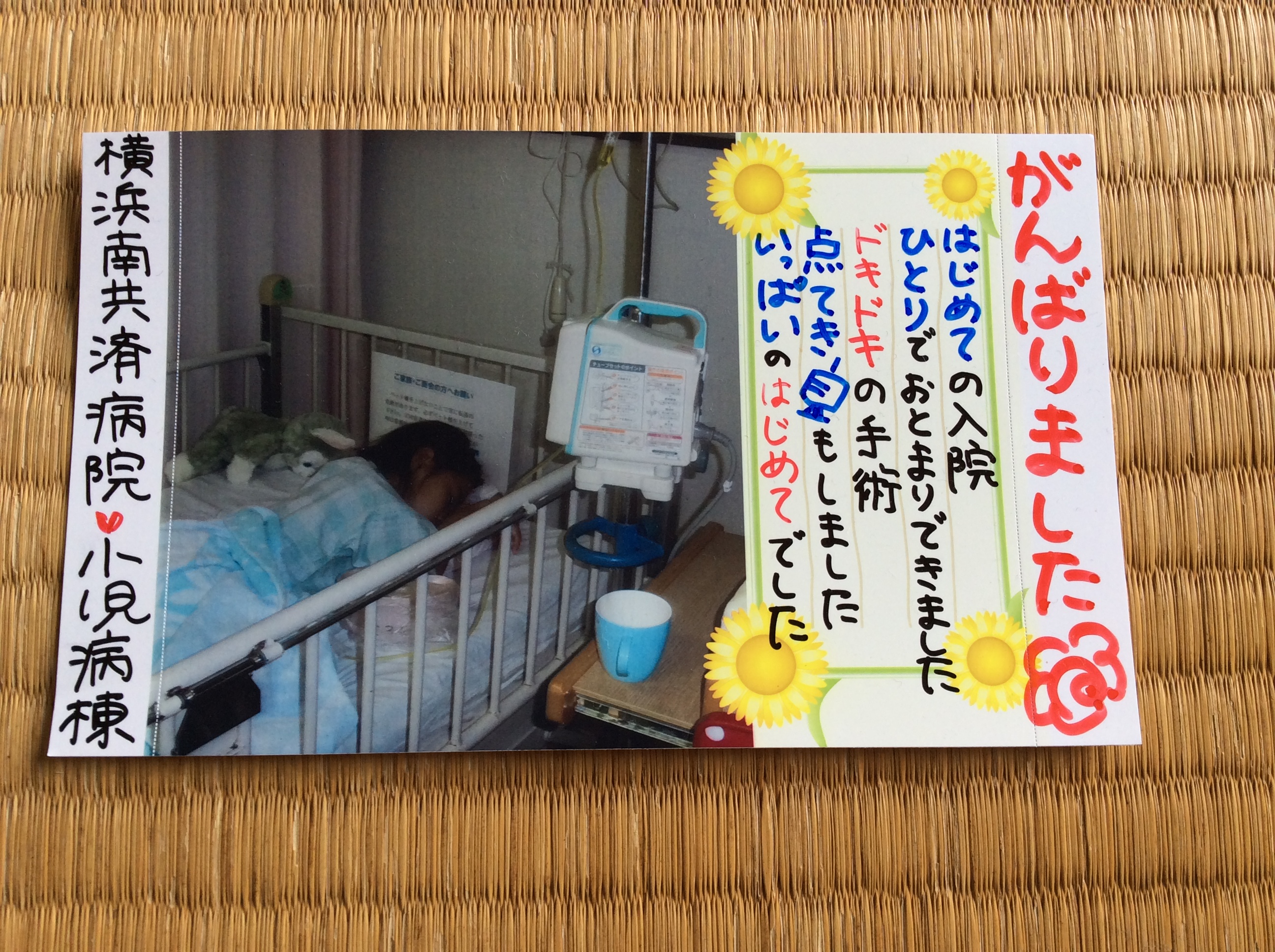 My 6 year-old daughter had her tonsils and adenoids out over summer vacation. She had been diagnosed with sleep apnea several months earlier and since nothing else was helping, finally I reluctantly agreed to the surgery.
My 6 year-old daughter had her tonsils and adenoids out over summer vacation. She had been diagnosed with sleep apnea several months earlier and since nothing else was helping, finally I reluctantly agreed to the surgery.
I was reluctant because hospital “culture” in Japan is very different from the US, where I am from, and because I knew I would be up against another cultural wall in regards to care for my older child.
This surgery, that requires a one-night stay in the hospital in either the US or UK (according to some quick research on my part,) here in Japan means seven nights in the hospital.
Since hospital rooms are shared, parents are not allowed to stay over night for any except the youngest of patients. Parents are expected to provide clean laundry and cutlery for the patient every day.
The children’s ward had a strict daily schedule, with times when they we’re confined to their beds (which literally had bars like a prison cell,) and times when, if they were well enough, they were allowed to use the playroom.
But absolutely under no circumstances whatever could they leave the children’s ward. And visitors under the age of 15 were not allowed in the ward.
This was a conundrum for me. I have a 9 year old son, who was on summer vacation at the time, and a husband who works 12 hour days, on a good day.
Hospital culture in Japan is strangely at odds with the wider culture in general. A high percentage of children co-sleep with their parents well into their elementary years. That is the cultural norm.
However, the hospital where my daughter had surgery, would not allow parents to spend the night with children over 2 years old.
This particular hospital allows parents of small children to stay until they fall asleep, but for my daughter, that may actually have been worse. Come lights out at 8pm, there was more crying in the children’s ward than from the nursery down the hall.
I had another child waiting at his friend’s house or at Baba’s (grandmother’s) house for me to come home, after all. My husband tried to get home from work at a decent hour, but I think he made it by 7pm once.
The day after the surgery, when my daughter was still feeling ill from the effects of the anesthesia and started bleeding from her nose, I was very grateful that she was in the hospital where I could have a professional attend to any concerns with the push of a nurse-call button.
Around Day 3, though, I could feel myself beginning to fall apart, fiber by fiber. The stress and plain old-fashioned exhaustion were starting to get to me.
My son at home was starting to feel the effects of being shuffled from place to place numerous times a day. My daughter wasn’t sleeping well and wanted to come home. I begged the doctor to discharge her a bit early, even a few hours would be great. His response was that the other child in the same room who’d had the same surgery on the same day was not recovering as well, and it would be upsetting for her if mine left earlier.
Excuse me, what? I thought, blinking several times, sure I had misheard. But I hadn’t.
On the day she was finally discharged, the nurses and staff presented her with a postcard, complete with a photo of her post-op, “to remember them by.” My first instinct was to burn it. Who would want to remember this? But I kept it, an ironic little reminder of the Japanese tendency to have “entrance” and “exit” ceremonies for everything.
I was reminded of a speech the principal of a junior high gave to the student body to announce that I was leaving: “People enter our lives, and at some point we must be parted. We should cherish each of these events.” Perhaps one day my daughter will value the card.
For now, she gets angry every time she sees it. The poor little girl has been waking up at night just “making sure I’m at home” for the past several weeks.
But now I look at the card and I feel profoundly thankful that my kids are, for the most part, healthy and happy. I don’t know how parents, who have to juggle (and it is a juggling with knives-type event, not harmless bean bags) a child’s hospitalization—along with the mundane tasks of everyday life that just keep coming, even when we are least able to deal with them—do it.
I say a little prayer for you every night, moms I do not know, and wish you strength and patience and space to breathe.
Has your child ever been hospitalized? What was it like for you, as a parent?
This is an original post to World Moms Blog from our mother of two in Japan, Melanie Oda.
The image used in this post is credited to the author.
If you ask Melanie Oda where she is from, she will answer "Georgia." (Unless you ask her in Japanese. Then she will say "America.") It sounds nice, and it's a one-word answer, which is what most people expect. The truth is more complex. She moved around several small towns in the south growing up. Such is life when your father is a Southern Baptist preacher of the hellfire and brimstone variety.
She came to Japan in 2000 as an assistant language teacher, and has never managed to leave. She currently resides in Yokohama, on the outskirts of Tokyo (but please don't tell anyone she described it that way! Citizens of Yokohama have a lot of pride). No one is more surprised to find her here, married to a Japanese man and with two bilingual children (aged four and seven), than herself. And possibly her mother.
You can read more about her misadventures in Asia on her blog, HamakkoMommy.
More Posts

by Jennifer Burden | Sep 24, 2014 | 2014, International, Social Good, World Voice
Following the Social Good Summit, World Moms Blog was invited to a private event focused on the immediate humanitarian need to contain and eradicate the Ebola virus. It was eye opening, and we can’t wait to share what we learned and what actions everyday citizens can take…
“We have to get ahead of this crisis.” — Carolyn Miles, CEO of Save the Children on the Ebola outbreak in West Africa.
Carolyn Miles, CEO of Save the Children, reported that her organization is working in all three countries with the most Ebola cases: Guinea, Liberia and Sierra Leone. Ebola has a high fatality rate and isolation helps calm the virus down. Children are being orphaned at an increasing rate, and burial practices and safety are of importance, as the virus is still active after death. As the crisis increases, Miles says the goal is to also increase the amounts of Ebola Community Units (EBCs) that Save the Children has been setting up.
The introduction of an EBC gives aid workers the ability to work with people in the communities affected to increase trust in the treatment of the dangerous virus and helps get people out of their homes to decrease the chance of infecting family members. Miles also noted that the governments of the US and the UK are also running treatment centers in the countries affected.
Christopher Elias, President of Global Development at The Bill and Melinda Gates Foundation, describes the space and scope of Ebola “unlike anything they have seen.”
This is the first outbreak in Western Africa and the 1st in urban areas. In fact, just two weeks ago, The Bill and Melinda Gates Foundation ear tagged $50 million dollars to go toward eradicating Ebola. By the time they had made the announcement, they had already handed out the first $13 million, which indicates the urgency of the need, according to Elias. The $50 million commitment is the largest Gates has made to a humanitarian crisis. This is just the beginning, as $1 billion is needed to complete the mission, according to the ONE Campaign. Christopher Elias explains the 4 part strategy for the Ebola funding, as follows:
The 1st part of the strategic plan for where the Gates money will benefit is to partners such as the U.S. Centers for Disease Control (CDC), the World Health Organization (WHO) and others. In fact, the first $1 million was allotted to UNICEF.
The second step is to fund research, as there is a need for both, a cure and a better test to diagnose Ebola.
Third, the strategy is focused at the country level.
Something very unique to controlling this outbreak is the use of health systems previously in place from the efforts to eradicate polio in Lagos, Nigeria.
The capital city had 19 cases, but health workers were able to control it quickly. Same was true for Senegal, where there was one case that was rapidly contained. Part three of the strategy will be how resources in countries affected can be complemented to help.
And the fourth part of the financing strategy for the Gates commitment is to join partnerships with the CDC and others to calculate which countries will be at risk for the spread of Ebola. Identifying and anticipating where Ebola could travel next, will help those countries prepare if the virus does indeed arrive. As already mentioned, the quicker the containment of the disease, the less likely it is to spread.
Carolyn Miles noted that where there are no health systems intact, in the more rural areas, there is the most risk of the virus spreading. In the more urban areas, as mentioned, the legacy of the polio eradication efforts are already in place to contain and treat Ebola.
We also heard from Jamie Drummond, co-founder of the ONE campaign, who pointed out that strengthening the economies in countries vulnerable to the disease is important. The world needs more sustainable systems, and, in fact, according to Drummond, it is estimated that $1 billion is needed for the Ebola crisis. He explained that the money could come from GAVI, but that would come at the expense of endangering the vaccination programs already planned to prevent other deadly diseases. Realistically, we need to deal with Ebola AND get GAVI the money it needs to carry on it’s already life-saving work.
The three countries currently affected by Ebola have significant natural resources. Had these natural resources been managed well in the past, the money to combat the virus would be here today. ONE insists that we need long-term investments in functioning economies.
On that note, we were told about the “Publish What You Pay” campaign to expose corruption and unveil money laundering schemes. In many countries throughout Africa there is no budget transparency, and citizens cannot see how the money is used. This campaign is working hard toward better functioning economies in Africa.
Towards the end of the conference, actor Idris Elba, famous for his role as Nelson Mandela, among others, arrived. Having roots in Sierra Leone and Ghana, he explained that he is dedicated to lend his celebrity to help the crisis in West Africa. He also noted that the Sierra Leone economy has been slashed by over 30% and that 75% of the Ebola victims are young women, who are more likely the caregivers for people suffering from the virus. In addition, he explained that in Sierra Leone there is a large group of thousands of young adults mobilized and going door to door to give out information about Ebola. But, this group is heavily fatigued. Elba is hoping to rally them forward.
World Moms, Elizabeth Atalay, Kyla P’an and myself, left the conversation briefed on just how large of a problem Ebola is and can be, and the importance of immediate action.
Three Steps YOU can take to help #ENDEBOLA right now!!!
1.) Sign this petition to tell world leaders to ACT on Ebola now!
2) Donate. Every little bit helps, to organizations on the ground, such as Save the Children.
3) Share. Download this image and share on Facebook, Twitter, Instagram, etc.:
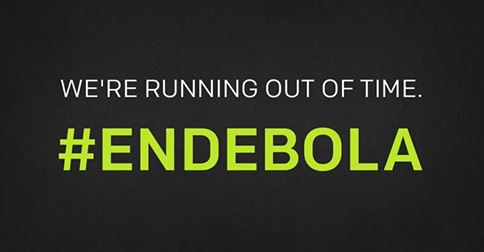
Together, we can take action to save lives!
This is an original post to World Moms Blog by founder, Jennifer Burden, in New Jersey, USA.
Image credit to ONE.org.

Jennifer Burden is the Founder and CEO of World Moms Network, an award winning website on global motherhood, culture, human rights and social good. World Moms Network writes from over 30 countries, has over 70 contributors and was listed by Forbes as one of the “Best 100 Websites for Women”, named a “must read” by The New York Times, and was recommended by The Times of India.
She was also invited to Uganda to view UNICEF’s family health programs with Shot@Life and was previously named a “Global Influencer Fellow” and “Social Media Fellow” by the UN Foundation. Jennifer was invited to the White House twice, including as a nominated "Changemaker" for the State of the World Women Summit. She also participated in the One Campaign’s first AYA Summit on the topic of women and girl empowerment and organized and spoke on an international panel at the World Bank in Washington, DC on the importance of a universal education for all girls. Her writing has been featured by Baby Center, Huffington Post, ONE.org, the UN Foundation’s Shot@Life, and The Gates Foundation’s “Impatient Optimists.” She is currently a candidate in Columbia University's School of International and Public Affairs in the Executive Masters of Public Affairs program, where she hopes to further her study of global policies affecting women and girls.
Jennifer can be found on Twitter @JenniferBurden.
More Posts - Website
Follow Me:


 It was my fourth birthday party. Since we were moving to Brazil soon, it was also a farewell party, and a big one. It was the only big birthday party I have had in my entire life. I remember it was held at some sort of club, there were a lot of people and a hired caterer (something almost unthinkable for my mother!) And then there was the clown. And he wanted to paint my face.
It was my fourth birthday party. Since we were moving to Brazil soon, it was also a farewell party, and a big one. It was the only big birthday party I have had in my entire life. I remember it was held at some sort of club, there were a lot of people and a hired caterer (something almost unthinkable for my mother!) And then there was the clown. And he wanted to paint my face.



 “I was not born for one corner; the whole world is my native land.” -Seneca
“I was not born for one corner; the whole world is my native land.” -Seneca
















